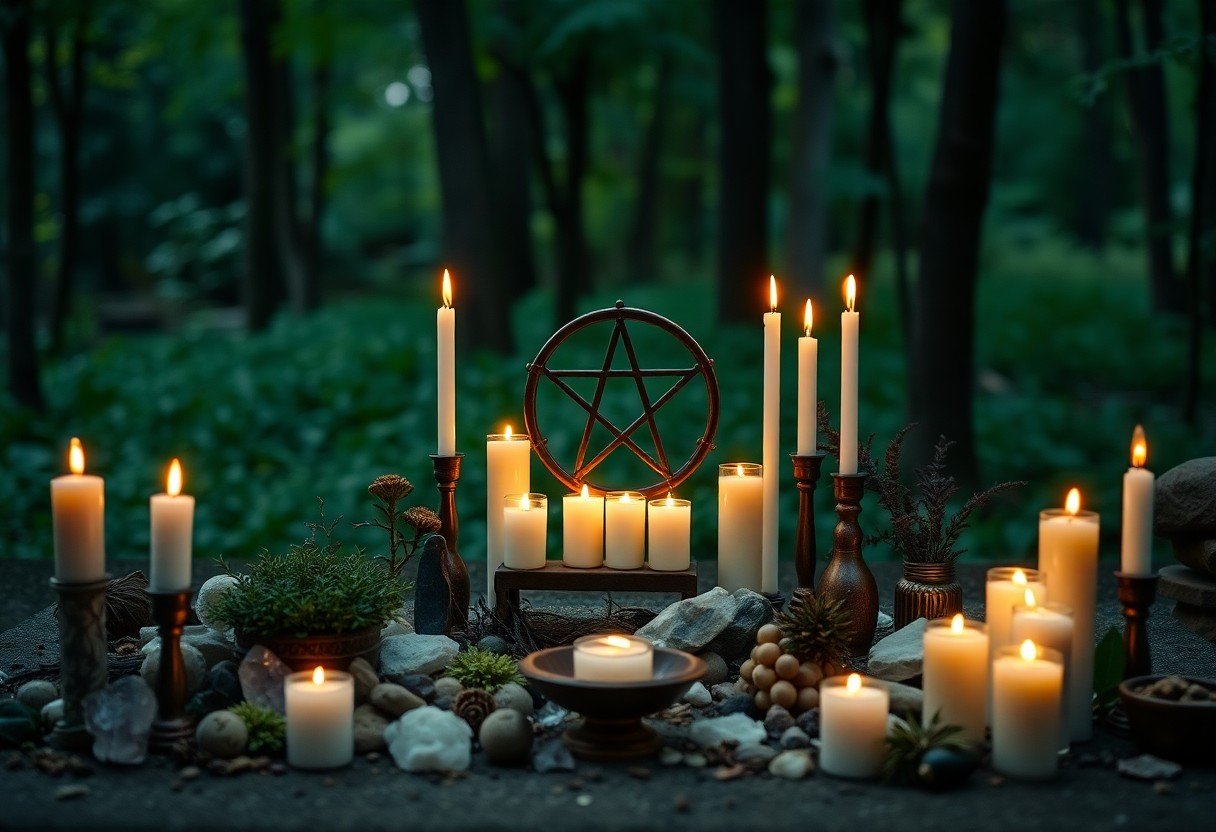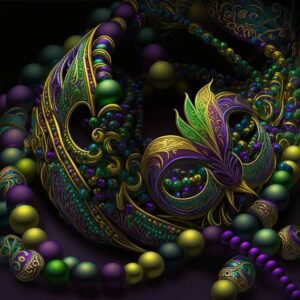Beliefs in Wicca center around the reverence of nature, the practice of magic, and the worship of a dual deity often perceived as the God and Goddess. As you explore Wiccan spirituality, you’ll find a strong emphasis on the Wheel of the Year, which celebrates seasonal festivals, and the Threefold Law, encouraging you to act with responsibility and integrity. Wiccans also believe in the interconnectedness of all living things, promoting positive relationships with the environment and others. By understanding these principles, you can gain insight into a rich and diverse spiritual tradition.
Core Beliefs of Wicca
While Wiccans embrace a diverse array of beliefs, they generally unify under core principles such as the reverence for nature, the practice of magic, and the celebration of the duality of the divine. These elements guide your interactions with the world, promoting a profound connection to the environment and a sense of ethical responsibility in your actions. This respect for all living things shapes your moral framework, which is often expressed through rituals, ceremonies, and the observance of seasonal cycles.
The Nature of Deity
Behind Wiccan beliefs lies the concept of a dual deity, often represented as the God and Goddess, embodying both masculine and feminine energies. You may find that this duality reflects the balance found in nature, with each aspect possessing unique attributes and powers. This perspective encourages you to embrace both sides of your own nature, fostering a deeper understanding of self and the interconnectedness of all things.
The Wiccan Rede
After establishing a framework of beliefs, Wiccans often follow the Wiccan Rede, a guiding ethical code that asserts, “An it harm none, do what ye will.” This principle emphasizes personal responsibility, urging you to consider the consequences of your actions. By adhering to this tenet, you cultivate a mindset that promotes harmony and respect towards others, while also allowing for personal freedom.
For instance, the Wiccan Rede encourages you to take a thoughtful approach to your choices, highlighting the importance of considering their impact. If your actions may cause harm to others, you are guided to seek alternative paths. The Rede emphasizes the power of intention and the belief that what you send into the world, whether positive or negative, will eventually return to you. This awareness nurtures your ethical conduct and fosters a sense of accountability, reinforcing the idea that your actions matter in both the seen and unseen realms.
Rituals and Practices
One of the core aspects of Wicca is its rich tapestry of rituals and practices that connect you to nature and the divine. These rituals often involve the use of symbols, tools, and invocations to honor deities, celebrate the cycles of nature, and manifest change in your life. You may find yourself celebrating seasonal festivals, engaging in group coven activities, or observing solitary practices that align with your personal beliefs and energies.
The Wheel of the Year
On your journey through Wicca, you will encounter the Wheel of the Year, a cycle of seasonal festivals that mark important agricultural and solar events. Each Sabbat, such as Samhain or Beltane, provides you with an opportunity to connect deeper with the energies of the Earth and the cycles of life, death, and rebirth.
Magic and Spellwork
Beside rituals, you may feel drawn to practice magic and spellwork, which are integral components of Wiccan beliefs. These practices allow you to harness the energies around you for personal growth and transformation.
Indeed, when you engage in magic and spellwork, you are tapping into natural forces and directing them to accomplish your intentions, whether for love, protection, or healing. You’ll learn to create spells using various components like herbs, crystals, and candles, which can enhance your focus and power. However, it’s vital to approach this practice with caution and respect; improper or selfish intentions can lead to negative repercussions in your life. Always remember to follow the ethical guideline known as the Wiccan Rede, “An it harm none, do what ye will,” to ensure your magical workings remain positive and aligned with the greater good.
Ethics and Morality
There’s a strong focus on ethics and morality within Wiccan beliefs, emphasizing personal responsibility and the impact of your actions on yourself and others. Wiccans subscribe to a code of conduct that encourages respect, kindness, and harmony with all living things, guiding you in your daily interactions and spiritual practices.
The Threefold Law
For Wiccans, the Threefold Law is a significant ethical principle, which states that any energy or intention you send out into the world—whether positive or negative—will return to you threefold. This law encourages mindfulness and awareness in your actions, as you are responsible for the consequences of your choices.
Respect for Nature
One of the core tenets of Wiccan ethics is a deep respect for nature. This belief promotes a harmonious relationship with the Earth, reminding you that all living beings are interconnected and deserving of care and reverence.
Indeed, respecting nature is paramount for Wiccans, as it reflects the understanding that you are a part of the greater Web of Life. Neglecting this bond can lead to environmental degradation and the loss of biodiversity, which poses a danger to your world. By living sustainably and honoring the natural cycles, you contribute to the health and wellbeing of the planet. This can involve practices such as recycling, using natural resources wisely, and participating in conservation efforts. Your active role in protecting this precious environment is both a moral obligation and a way to express your spirituality.

Community and Initiation
Your journey into Wicca involves the important aspects of community and initiation, which offer you a sense of belonging and spiritual growth. Many Wiccans find strength and support within a group setting, often referred to as a coven. Initiation ceremonies are significant milestones, marking your acceptance into the Wiccan community and your commitment to its practices and beliefs. These rituals vary widely among individuals and covens, often featuring the blessings of the Elements and the Goddess.
Covens and Solitary Practices
An necessary aspect of Wiccan practice is the choice between working in a coven or as a solitary practitioner. Joining a coven allows you to participate in collective rituals and share experiences with others who have similar beliefs. In contrast, solitary practice offers you the freedom to explore and develop your own personal path without the influence of others. Each path has its unique benefits, encouraging you to find the one that resonates with you.
Rites of Passage
Besides dedicated rituals for honor and celebration, Wiccans also observe rites of passage that mark important life stages. These rituals can include initiation, handfasting (marriage), and planned transitions such as welcoming a new baby. Through these ceremonies, you acknowledge significant moments in your life, creating a meaningful connection to your spirituality. Rites of passage foster community bonds and reinforce individual commitments, guiding you on your path within Wicca.
Solitary practice often leads you to develop a deeply personal and unique approach to rites of passage. You might create your own ceremonies that resonate with your life experiences and values. For significant events such as a move, new job, or personal transformation, you can design rituals that align with your intentions. By doing this, you reaffirm your connection to the divine and the larger universe while fostering an intimate relationship with your spiritual practices. Personalizing rites of passage allows you to celebrate your journey authentically and meaningfully.
The Role of Symbols and Tools
Keep your mind open to the significance of symbols and tools within Wiccan practice. These elements are crucial for connecting with the divine, channeling energies, and enhancing your rituals. They serve as focal points that allow you to tap into the spiritual realm and lend deeper meaning to your spiritual journey.
Common Wiccan Symbols
Before delving into the complexities of Wicca, familiarize yourself with some of the most common symbols. These may include the pentacle, representing earth and protection, the triple moon symbolizing the Goddess, and the ankh, signifying life and immortality. Each symbol carries its unique energy, inviting you to incorporate them into your practices for added depth.
Ritual Tools and Their Uses
Beside symbols, various ritual tools play an important role in Wiccan traditions. Each tool is not just a physical object; it holds spiritual significance that enhances the energy of your rituals. Common tools include the athame (ritual knife), wand, chalice, and pentacle, each serving specific purposes in your practice.
Also, the tools you choose can greatly influence the outcome of your rituals. The athame is often used for directing energy and creating a sacred space, while the chalice symbolizes the element of water and is used for offerings or blessings. A wand helps channel your intentions, and the pentacle serves as a representation of earth and protection. By harnessing the power of these tools, you can enhance your practices, making them more meaningful and effective.
Misconceptions About Wicca
Not every practice associated with Wicca is linked to malevolence or a dark agenda. Many misunderstandings stem from depictions in popular culture, leading to the belief that Wiccans engage in black magic or have sinister motives. In reality, Wicca is centered on harmony, respect for nature, and positive spiritual growth.
Differentiating Wicca from Witchcraft
Differentiating between Wicca and witchcraft is necessary for understanding these paths. While Wicca is a formal religion with beliefs and rituals, witchcraft encompasses a broader range of practices, some of which may not align with Wiccan principles. Wiccans often view witchcraft as a tool for their spiritual practices, focusing on nature and reverence for the Earth.
Knowing the true essence of Wicca allows you to stand strong in your beliefs while encouraging dialogue towards greater understanding.
To wrap up
As a reminder, Wiccans believe in a diverse set of principles that center around a deep reverence for nature, the honoring of a dual deity of the God and Goddess, and the practice of magic as a means of personal empowerment and healing. You may also find that Wiccans emphasize the importance of ethical conduct, particularly the Wiccan Rede, which encourages you to “harm none.” Ultimately, your journey into understanding Wicca can reveal a rich tapestry of beliefs focused on spiritual connection, self-discovery, and communal harmony.
















